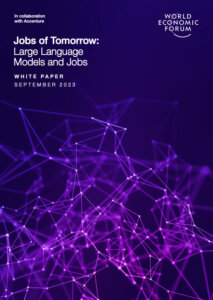
AI can enhance meeting professionals’ jobs and boost their productivity, but isn’t likely to replace them, a new report from the World Economic Forum suggests.
There’s a lot to unpack in the 296-page report released Sept. 19 by the World Economic Forum (WEF) about the impact of Large Language Models (LLM) — aka generative AI — on jobs. But the headlines hold very good news for those working in the business events industry: Among the jobs expected to be least exposed to the threat posed by generative AI’s impact are those that involve both human interaction and complex thinking skills.
The white paper, “Jobs of Tomorrow: Large Language Models and Jobs,” analyzed 19,000 tasks across 867 occupations listed by the U.S. Bureau of Labor Statistics, assessing the risk of LLM tools displacing workers as well as the potential for those tools to increase productivity. The report zeroed in on LLM tools such as ChatGPT, its authors wrote, because of the explosion in their use over the last year and the fact that an estimated 62 percent of work tasks are language-based.

The World Economic Forum white paper analyzed 19,000 tasks across 867 occupations, assessing the risk of large language model tools displacing workers as well as the potential for those tools to increase productivity.
While none of the listed occupations were directly identified with the business events industry, many of report’s findings about the kinds of jobs that had the greatest potential to be boosted — rather than replaced — by generative AI tools read, almost uncannily, as if they were directly lifted from a business event professional’s job description. They are jobs, the report’s authors wrote, which require “abstract reasoning skills and a high degree of personal interaction and collaboration, such as the negotiation of contracts, the development of educational programs,” as well as “coordinating with others to resolve problems.”
Business events professionals already are embracing tools like ChatGPT in large numbers — 64 percent of event professionals surveyed are now using AI in some form, according to respondents to Convene’s upcoming Meetings Market Survey. And as Convene reported in “The AI Tool You Can’t Ignore,” they are turning to ChatGPT to take over the same tasks that the WEF paper identified as most ripe for automation, including analyzing data and conducting research.
ChatGPT is “revolutionizing” how she works in areas that include crunching event data, Megan Finnell, CMP, HMCC, director of meetings and conferences for the Medical Group Management Association, told Convene Senior Editor Jennifer Dienst. “The things that we all hate to do and those tasks that are just irritants for us, we’re all going to figure out how to get AI to do them for us,” Finnell said. “And the things that we couldn’t do before, because they were too complex or took too long manually, we will find AI ways to shortcut them or to do it for us in order to deliver results that we couldn’t deliver before.”
Event professionals are also using ChatGPT for creative work like brainstorming ideas, writing scripts for videos, and creating social media posts. “AI may not be able to take over tasks involving critical thinking and complex problem-solving,” the WEF report said, “but it will be able to lend a hand.”
One of the recommendations offered by the “Jobs of Tomorrow” report to help workers navigate change is “providing training programs that give workers AI literacy but also emphasize human skills such as creativity, empathy, and strategic thinking.” The report is a follow-up to WEF’s “Future of Jobs Report 2023,” released in May, which ranked training workers in how to use AI and big data third among skills-training priorities, just behind analytical and creative thinking.
Barbara Palmer is deputy editor at Convene.
